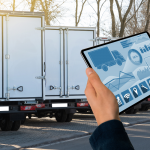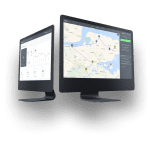Become future-ready: Using eco-friendly delivery & shipping solutions
Delivery methods and last-mile deliveries are accountable for over 90% of the impact made on the environment.
The packaging techniques and delivery procedures employed by fulfilment firms notably harm the environment and wreak considerable chaos.
There exists a considerable demand for eco-friendly delivery and shipping solutions; it is imperative that e-commerce enterprises gradually transition to sustainable practices in their delivery processes.
By achieving self-sufficiency in delivery operations and adopting eco-friendly delivery strategies, ecommerce businesses can embark on the preliminary steps to shrink the environmental damage induced by the current delivery ecosystem.
What is Eco-friendly shipping?
Eco-friendly shipping entails utilising biodegradable materials in the packaging and shipment of products, facilitating easy recycling and decomposition.
It also denotes adopting low-carbon emission shipping techniques, amalgamating orders into unified shipments, and embracing potent methods to lessen the environmental burden of delivery parcels.
Demonstrating your commitment to environmental well-being through sustainable packaging can enhance your brand’s reputation and foster customer trust.
What is Eco-friendly delivery?
Eco-friendly delivery signifies a commitment to a delivery process that minimises environmental detriment. Various establishments, including restaurants, ecommerce businesses and retailers, can adopt sustainable approaches like route optimisation and utilising low-carbon emission vehicles to lessen their ecological footprint.
The impact of deliveries and shipping on the environment
The rapidity, ease, and omnipresence encourage customers to gravitate towards online shopping, escalating demand. Nevertheless, the adverse side of e-commerce compromises the environment, correlating with the surge in sales.
Research indicates that Amazon’s carbon dioxide emissions are comparable to a small nation’s. Additionally, over a third of solid waste in the United States is generated from eCommerce packaging, a figure that is rising sharply.
Plus:
- Freight ships generate soot or black carbon due to the combustion of heavy fuel oil, significantly contributing to adverse environmental effects. 21% of black carbon emissions stem from using diesel, coal, and biomass fuels during the shipment procedure.
- On average, 165 billion parcels are dispatched yearly, using cardboard equivalent to 1 billion trees. Furthermore, numerous delivery enterprises opt for plastic as a substitute for cardboard, exacerbating the environmental issue.
- Global eCommerce sales have led to an additional 7,500,000 plastic bags. Depending on their composition and material type, these plastics take 50-500 years to break down.
- Last-mile delivery is the primary source of greenhouse gas emissions and significant local air pollution that can negatively impact nature.
- As the eCommerce sector evolves, return delivery services are becoming vital for businesses, albeit at the expense of exacerbating environmental damage and diminishing air quality.
Nonetheless, given the heightened awareness and the availability of superior alternatives within the sector, eCommerce and delivery enterprises must transition to eco-friendly packaging.
Concerns regarding sustainability in last-mile deliveries
According to a CGS survey, 28% of consumers prioritise sustainability regarding brand allegiance. However, as per McKinsey, merely 25% of firms collaborate with suppliers to tackle inherent emissions within the supply chain.
Therefore, you could distinguish yourself from your competitors by demonstrating to your customers that your brand is actively diminishing carbon emissions in your supply chain by ensuring eco-friendly deliveries.
Numerous brands and ecommerce companies seize this marketing prospect through alterations in packaging. Yet, a fundamental source of emissions that many brands overlook is packaging and fuel emissions, route optimisation and delivery locations.
Packaging
As per the EPA, 14.5 million tonnes of plastic packaging material were produced in 2018. This manner of product packaging poses a significant sustainability issue due to its frequent single-use nature and occasional non-recyclability.
Upon reaching the consumer’s residence, these single-use packages swiftly enter the waste bin. By week’s end, they populate landfills. This cycle is typical with bubble wrap, poly mailers, and similar prevalent shipping supplies. Consequently, several brands have invested in green packaging, witnessing lower costs and emissions.
The selected materials and their application dictate the environmental impact of a package. For instance, a robust corrugated cardboard shipping box filled with a substantial amount of plastic packing peanuts exerts a more significant ecological toll than a parcel crafted from slender recycled cardboard accompanied by compostable, plastic-free inclusions. Various primary packaging materials exist, each with its distinct effects and expenses.
Implementing sustainable packaging methods can curtail carbon emissions, promoting eco-friendly shipping.
Fuel emissions
Fuel emissions constitute 74% of all human-induced greenhouse gas emissions in the US, as stated by the Environment Protection Agency (EPA). Of this, 36% is directly linked to the transportation sector – the nexus of the supply chain. Consequently, the principal focus of supply chain sustainability should be eco-friendly delivery and scrutinising the environmental repercussions of fuel utilised for product transportation.
As per EPA data, daily goods transportation amounted to 49.5 million tonnes in 2015, with projections indicating a 23.5% increment by 2025. Although the precise fuel quantity and consequent emissions vary per vehicle, an increase in transported tonnage equates to heightened emissions. Preempt this escalation in emissions by emphasising eco-friendly delivery strategies.
Delivery routes
Last-mile delivery is the primary source of greenhouse gas emissions and significant local air pollution that can negatively impact nature.
The evolving demands of the eCommerce sector have rendered return delivery services essential for enterprises, albeit due to adverse environmental effects and deteriorating air quality.
However, with increased awareness and more sustainable options in the industry, eCommerce and delivery businesses must transition towards eco-friendly route optimisation.
Delivery locations
With an increase in failed deliveries comes the inevitable rise in redelivery attempts, contributing to increased carbon emissions.
By drastically reducing the likelihood of failed deliveries, the use of parcel lockers contributes to lowering the carbon footprint of the delivery process. Bringing the package from a local distribution centre to the customer’s door – is notoriously the most complex and costly part of the delivery process. Parcel lockers are a novel solution to this problem.
Parcel lockers eliminate the need for direct contact between couriers and customers, reducing the logistical hassle of coordinating delivery times. Instead, parcels are delivered to secure, electronically managed lockers, from which customers can pick up their orders at their convenience, reducing the environmental footprint.
5 Strategies for eco-friendly delivery & shipping
Prioritise eco-friendly shipping and eco-friendly delivery with these three strategies.
1. Reduce emissions with route optimisation
Suppose you employ a self-delivery model for your enterprise. You fulfil orders as they are received. Alternatively, you could strategise to optimise your delivery vehicle’s route to reduce fuel usage before embarking on the journey.
For instance, an enhanced route could entail delivering the third order received as the first, a feature that GSMtasks can assist in determining and fine-tuning. GSMtasks facilitate the optimisation of your timetable per your parcel volumes and the lorry’s load capacity.
This allows you to augment the daily delivery quantities while consuming less fuel, boosting profits and diminishing your ecological footprint.
2. Use eco-friendly packaging materials
Accommodate more products in every box, undertake more deliveries per lorry, cut down on packaging expenditures, and decrease carbon emissions by opting for eco-friendly alternatives that lessen packaging wastage. Eco-friendly packaging encompasses recyclable cardboard boxes, biodegradable mailers, and air pillows.
Some websites highlight numerous brands that have chosen to eradicate single-use packaging from their shipping and delivery protocols, offering suggestions for consumers keen to engage in these initiatives.
Lola’s Cupcakes is another example of the success that can be found in reducing packaging. Lola’sCupcakes wanted to concentrate on eco-friendly delivery by diminishing the packaging volume and adopting renewable materials, reducing the bottom line and curtailing carbon emissions.

3. Use biodegradable recycled materials
As demonstrated by Lola’s Cupcakes, ecommerce firms possess alternatives to the prevalent usage of plastic for packaging.
Rather than plastic, enterprises can explore using recycled paper or biodegradable packaging materials to minimise their environmental footprint further. Biodegradable packaging, fashioned from materials like bamboo, seaweed, and mushrooms, decomposes swiftly.
4. Route optimisation aids in eco-friendly deliveries
The last-mile and courier sectors significantly contribute to adverse environmental effects, including air contamination, climate alteration, and ozone layer degradation.
Utilise GSMtasks to transition to eco-friendly delivery operations by choosing the optimised and most efficient routes, thereby minimising fuel consumption and cutting carbon emissions. Our route optimisation software can reduce fuel costs by 30%!
5. Consider the use of automated parcel lockers
Customers can choose when to pick up their parcels, accommodating their busy schedules and providing a personalised delivery experience. Plus, parcel lockers operate round-the-clock, providing customers with access to their packages anytime offering flexibility for pickup during non-traditional hours.
Parcel lockers contribute to increased profitability for carriers, as they streamline operations and reduce costs associated with missed deliveries and inefficient routes, offer a convenient alternative to traditional delivery methods, allowing customers to collect packages at their preferred time, eliminating the need for scheduling conflicts, and means ecommerce companies can make fewer deliveries, only a few to various parcel lockers.
The last-mile and courier delivery industries are the most significant contributors to harmful environmental impacts such as air pollution, climate change, ozone layer depletion, and other effects. Being a part of the industry, you can drive the change by adapting to eco-friendly ways of delivering products and contributing to improving the environment.
Using GSMtasks, you can transform towards eco-friendly delivery processing by following the shortest and optimised paths, requiring less fuel and reducing overall carbon emission.
Want to become more eco-friendly? Try GSMtasks! We have a FREE 14-day trial (no credit card required). Sign up and give it a try!
GSMtasks offers a 14-day free trial for all new users. The signup process for a free trial includes sharing information about your business so that the GSMtasks team can cater the perfect trial for your needs. During the trial period, you and your team will be supported in learning about the software and implementing its functions to maximise your company’s productivity.





